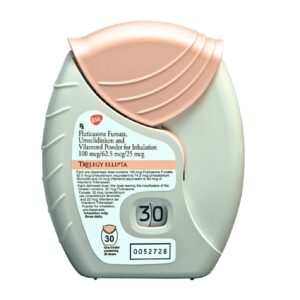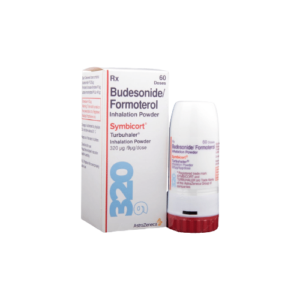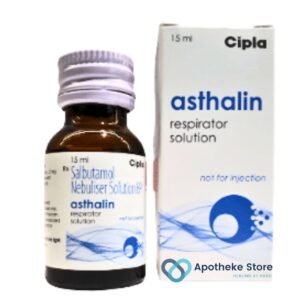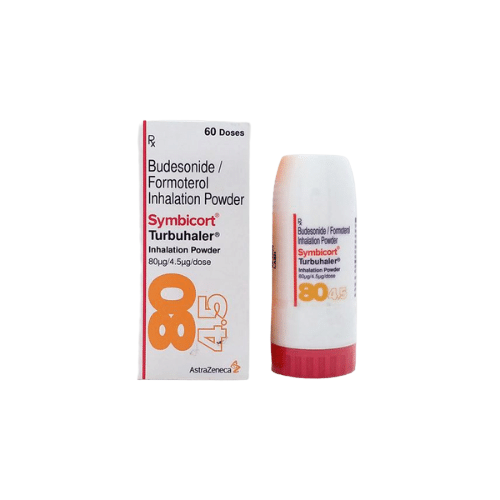Symbicort 80mcg/4.5mcg Turbuhaler
$50.00 – $150.00Price range: $50.00 through $150.00
Brand name – Symbicort Turbuhaler
Generic name – Budesonide/Formoterol
Manufacturer – AstraZeneca
Packaging – 1 unit per box
Delivery Time – 6 To 15 Days.
SKU
N/A
Category Asthma
Description
Symbicort 80mcg/4.5mcg Turbuhaler
Symbicort 80mcg/4.5mcg Turbuhaler is used for what?
Symbicort 80mcg/4.5mcg is used to control symptoms of asthma and prevent symptoms such as wheezing in children and adults from age 6 and older. COPD is a long-term chronic lung disease that includes chronic bronchitis, emphysema, or both.
Symbicort 80mcg/4.5mcg can be used for long-term to improve symptoms of COPD for better breathing and to reduce the number of flare-ups.
Precautions & Warnings
One should talk to a concerned doctor before you take this medicine if you are:
- Allergic to any of the components in this medicine
- Have high blood pressure
- Have an immune system problem
- Have heart, liver, or thyroid problems
- Have any type of viral, fungal, bacterial, or parasitic infection
- Are exposed to chickenpox or measles
Interactions
You should Inform your doctor if you are taking:
- Over-the-counter medicines, herbal supplements, or vitamins.
- Anti-HIV or Antifungal medicines
Directions for use
- Always take this medicine exactly as your doctor suggests you.
- Symbicort comes in 2 strengths. One should take daily 2 puffs in the morning and 2 puffs in the evening about 12 hours apart.
- Rinse your mouth with water and spit the water out after each dose of Symbicort. You should not swallow the water.
- By mistake, if you get Symbicort in your eyes, immediately wash your eyes with normal water, if your eyes get redness or irritation persists, consult your concerned doctor.
- Do not take too much Symbicort
- If you miss a dose, you should take your next dose at the same time as you regularly do.
- Do not stop any medicines used to control or treat your breathing problems
Side Effects of Symbicort
Common Side Effects
- Back pain
- Throat irritation or pain
- Inflammation of mucous membranes of the sinuses
- Upper respiratory tract infection
- Sinusitis (sinus infection)
- Nasal congestion
- Headache
- Vomiting
- Stomach discomfort
- Slowed growth in children
- Thrush in mouth and throat
Serious Side Effects
- Increased blood pressure
- Chest pain
- Tremor, Nervousness
- Adrenal insufficiency
- Increased wheezing
- Lower bone mineral density
- Eye problems including cataracts and glaucoma
- Serious allergic reactions including hives, rash, swelling of the face, mouth, or tongue, and breathing problems.
Additional information
| Packing Size | 3 Units, 6 Units, 9 Units |
|---|
Related products
-

Trelegy Ellipta (Inhalation Powder)
$95.00 – $278.00Price range: $95.00 through $278.00 Select options This product has multiple variants. The options may be chosen on the product page -

Symbicort 320mcg/9mcg Turbuhaler
$70.00 – $170.00Price range: $70.00 through $170.00 Select options This product has multiple variants. The options may be chosen on the product page -

Budesonide 200mcg (Budecort) Inhaler
$65.00 – $183.00Price range: $65.00 through $183.00 Select options This product has multiple variants. The options may be chosen on the product page -

Asthalin Respirator Solution 15ml (Salbutamol)
$15.00 – $41.00Price range: $15.00 through $41.00 Select options This product has multiple variants. The options may be chosen on the product page

